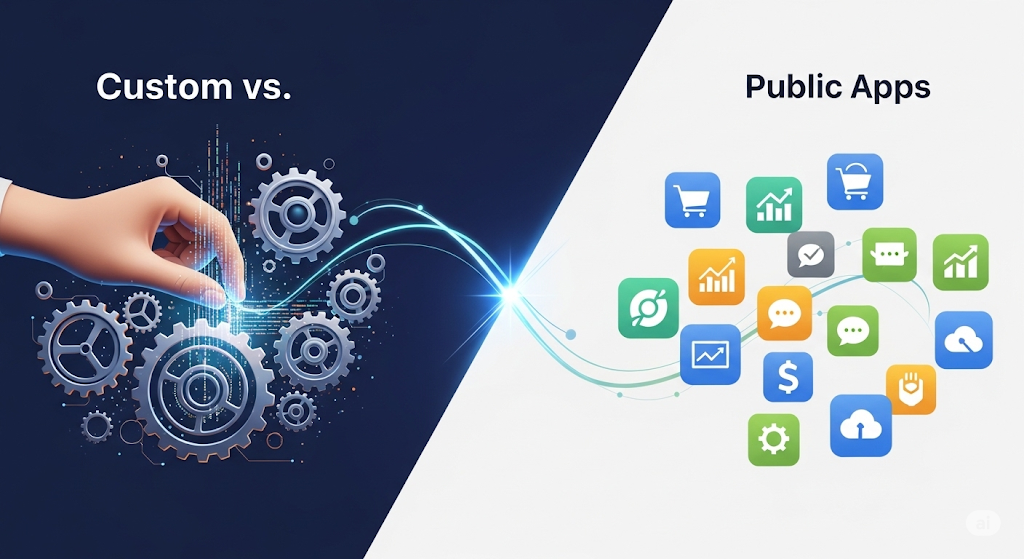Custom vs. Public Shopify Apps: Choosing the Right Path for Your Growth Stage

The Shopify App Store is a massive marketplace—with over 8,000 apps claiming to boost sales, streamline operations, and solve every eCommerce challenge imaginable. For many store owners, the big question isn’t if they need apps, but which type: stick with ready-made public apps, or invest in a custom solution?
The truth is, the answer changes as your business grows. A handmade jewelry startup’s needs look nothing like those of a multi-million-dollar D2C brand. An app that works brilliantly in year one might become a bottleneck by year three. Forward-thinking merchants work with a Shopify app development company to match their technology strategy to their growth stage — avoiding costly rebuilds down the line.
Here’s how to decide when public apps are enough, and when it’s time to go custom.
What Are Public Shopify Apps? The Quick and Accessible Choice
Public Shopify apps are available directly through Shopify’s App Store. They’re designed to serve thousands of merchants at once, making installation quick and painless. Most store owners can go from browsing to fully configured in a matter of hours.
Advantages include:
-
No coding required – Install, configure, and launch almost instantly.
-
Budget-friendly options – Many offer free or low-cost plans.
-
Proven reliability – Battle-tested by a wide variety of stores.
-
Hands-off maintenance – The app developer handles updates and bug fixes.
Familiar names include Klaviyo for email marketing, Judge.me for product reviews, and Oberlo for dropshipping. These tools solve common problems quickly — perfect for stores with standard requirements. But when you need features that go beyond “one size fits all,” you’ll need Shopify development services to create something more tailored.
The Downsides of Public Apps
Generic apps are built for the average use case — which means they can’t always cover unique business needs. Merchants may end up paying for features they never use, while lacking critical functionality they actually need.
For example:
If your subscription-based business requires custom billing cycles or advanced pause/resume options, a standard app might force awkward workarounds. These inefficiencies can slow operations, frustrate customers, and hurt retention.
Performance can also take a hit. Multiple public apps running together often inject extra scripts into your site, increasing page load times. This impacts both user experience and Google’s Core Web Vitals — ultimately affecting SEO and conversion rates.
Public apps work best for:
-
New businesses testing product-market fit
-
Tight budgets and lean teams
-
Standard operational needs with minimal customization
-
Early-stage stores prioritizing speed over complexity
What Are Custom Shopify Apps? Purpose-Built for Your Business
A custom Shopify app is built specifically for your store’s needs by a Shopify website development company. Every feature aligns with your exact workflows, without unnecessary extras.
Custom development can take several forms:
-
Private Apps for Single Stores – Exclusive tools with complete control over functionality and updates.
-
Custom Middleware – Bridges Shopify with other business systems, like accounting software, CRMs, or inventory management tools.
-
Native Integrations – Direct connections with enterprise tools for seamless data flow across ERP, WMS, and customer platforms.
Real-world impact example:
A skincare subscription brand struggled because public apps couldn’t track custom ingredient combinations for each order. A Shopify development agency built a custom integration that synced their formulation database with subscription logic. Customers could adjust ingredients between deliveries, inventory updated automatically, and retention jumped 40%. Support tickets dropped by half, saving thousands annually.
Custom apps also enhance security (fewer external vulnerabilities) and scale effortlessly — you can add features without disrupting existing systems.
Matching Your App Strategy to Your Growth Stage
The right choice depends heavily on your current business phase:
Startup Stage (0–1 Year)
-
Priority: Speed and revenue growth over perfection.
-
Best fit: Public apps for essential tasks.
-
Example tools: Yotpo (reviews), Mailchimp (emails), Stripe (payments).
-
Why: It’s too early for heavy investment in custom development. Focus on proving your market.
Growth Stage (1–3 Years)
-
Priority: Balancing stability with emerging needs.
-
Best fit: Hybrid approach — keep effective public apps, but add custom integrations or analytics tools for competitive advantage.
-
Example: Retain Klaviyo for email, but build a custom reporting dashboard to combine marketing, sales, and inventory insights.
Enterprise Stage (3+ Years)
-
Priority: Competitive differentiation and operational efficiency.
-
Best fit: Fully custom, enterprise-grade apps.
-
Example features: ERP integration, AI-driven product recommendations, B2B account management, and custom reporting dashboards.
How Hydrogen Shopify Solutions Fit In
For brands that want cutting-edge storefront performance, Hydrogen Shopify solutions offer a modern, React-based framework for building lightning-fast, fully customized experiences. When paired with a custom app strategy, Hydrogen allows for unique storefronts that load quickly, scale globally, and provide a competitive edge in UX.
The Value of Partnering with the Right Shopify Development Company
An experienced Shopify development company offers more than coding — they bring strategic insight, technical expertise, and long-term support.
What they deliver:
-
Strategic consultation – Understanding your workflows, growth plans, and limitations.
-
Full development cycle – From planning and coding to QA and launch.
-
Ongoing optimization – Feature updates, performance improvements, and support.
If you’re ready to scale efficiently, it’s often best to hire Shopify developers who understand both your technical stack and your growth goals.
Final Takeaway
Choosing between public and custom Shopify apps isn’t just about features — it’s about aligning your tech stack with your growth stage. Public apps help you launch fast and keep costs low early on. Custom apps, built through professional software development services, unlock scalability, efficiency, and competitive advantage as you grow.
If you’re aiming to build a store that can evolve without limits, partner with a Shopify development company that can design, implement, and maintain solutions built for your unique journey.






